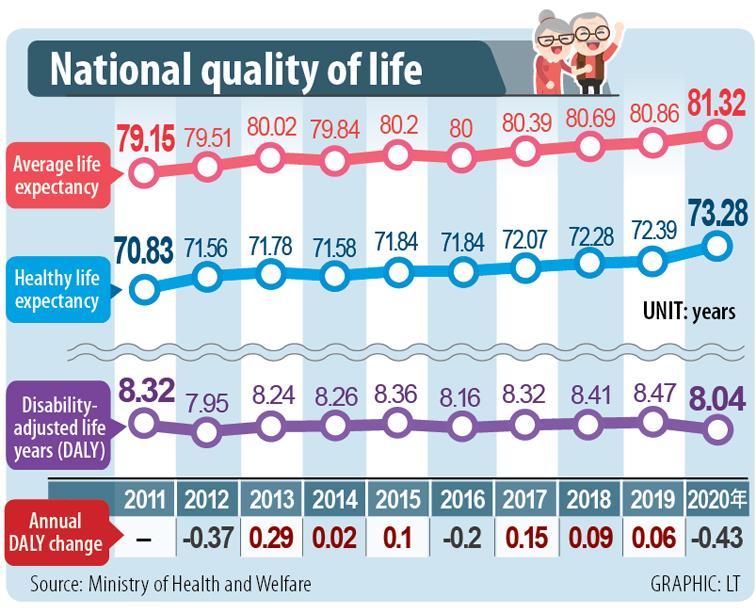Taiwanese on average added more than five healthy months to their lives during the first year of the COVID-19 pandemic, the largest gain in a decade due in part to a reduction in other communicable diseases, Ministry of Health and Welfare data showed.
The trend was reflected in the nation’s disability-adjusted life years (DALY), which measures the time a person spends in poor health or with a disability, or who dies before reaching the average life expectancy for their population.
It is typically used to measure the overall disease burden on a population, with a larger number indicating more years lost to poor health or premature death.

Ministry data showed that the DALY dropped to 8.04 in 2020 from 8.47 the year before, indicating an average of 73.28 years of health.
This means that Taiwanese on average lived about 5.16 more healthy months in the first year of the global COVID-19 pandemic than in 2019.
It was also the greatest drop in the DALY measure after a decade of steady gains, except for three years in which there were slight declines.
Reasons for the decline are twofold, Linkou Chang Gung Memorial Hospital geriatric specialist Chen Ying-ren (陳英仁) said on Saturday.
First was the relative disappearance of other communicable diseases such as influenza, pneumonia and the common cold, Chen said, crediting pandemic prevention strategies such as wearing masks and washing hands regularly.
This also contributed to a lower mortality rate, with more than 2,000 fewer deaths recorded in 2020 than in 2019, the first time in 11 years that the number of deaths and mortality rate decreased, he said.
Chen also attributed the lower DALY figure to a maturation of attitudes toward hospice care, as more patients and their families have become more willing to turn to hospices in their waning days and sign do-not-resuscitate orders.
“Views on the meaning and value of life are changing, which also perhaps contributed to the lower DALY number,” he added.
Hsu Chih-cheng (許志成), deputy director of the Institute of Population Health Sciences at the National Health Research Institutes, agreed that the decline in communicable disease was the likely cause, although he said that more research is likely necessary to confirm the inference and develop strategies to help affected populations.
For instance, if the DALY mainly measures the effect of chronic conditions, research is needed to determine which patients are most likely to benefit from a reduction in infectious disease, he said.
One year of DALY decline is a long time, but it is worth observing if it continued to fall throughout the domestic COVID-19 outbreak last year, Hsu said, adding that two years of data would provide more accurate results.
To keep the trend going, Deputy Minister of Health and Welfare Shih Chung-liang (石崇良) recommended “healthy aging” strategies to help preserve an acute body and mind well into old age.
He also advocated a reduction in ineffective medical care by better implementing the Patient Right to Autonomy Act (病人自主權利法), which protects people’s right to make their own decisions about the last stage of their lives.

Palauan President Surangel Whipps Jr arrived in Taiwan last night to kick off his first visit to the country since beginning his second term earlier this year. After arriving at Taoyuan International Airport at around 6:30 pm, Whipps and his delegation were welcomed by Minister of Foreign Affairs Lin Chia-lung (林佳龍). Speaking to gathered media, the Palauan leader said he was excited and honored to be back in Taiwan on his first state visit to Taiwan since he was sworn in this January. Among those traveling with Whipps is Minister of State Gustav N. Aitaro, Public Infrastructure

President William Lai (賴清德) yesterday thanked Palau for its continued support of Taiwan's international participation, as Taipei was once again excluded from the World Health Assembly (WHA) currently taking place in Switzerland. "Palau has never stopped voicing support for Taiwan" in the UN General Assembly, the WHO and other UN-affiliated agencies, Lai said during a bilateral meeting with visiting Palau President Surangel Whipps Jr. "We have been profoundly touched by these endorsements," Lai said, praising the Pacific island nation's firm support as "courageous." Lai's remarks came as Taiwan was excluded for the ninth consecutive year from the WHA, which is being held in

RESOLUTIONS DEBATE: Taiwan’s allies said that UN and WHA resolutions cited by China and other nations ‘do not determine Taiwan’s participation in WHO activities’ A proposal to invite Taiwan to this year’s World Health Assembly (WHA) was rejected on Monday, resulting in Taipei’s absence from the annual meeting for a ninth consecutive year, although partners spoke up for Taiwan’s participation at the first day of the meeting. The first agenda item after the opening was a “two-on-two debate” on a proposal to invite Taiwan to participate at the WHA as an observer. Similar to previous years, two countries made statements in favor of the proposal, while two others expressed their opposition. Philippine Secretary of Health Teodoro Herbosa, president of the 78th WHA, accepted the WHA General Committee’s

At least three people died and more than a dozen were injured yesterday afternoon when a vehicle struck a group of pedestrians in New Taipei City’s Sansia District (三峽). The incident happened at about 4pm when a car rammed into pedestrians at an intersection near Bei Da Elementary School. Witnesses said the sedan, being driven at a high speed, ran a red light, knocking scooters out of the way and hitting students crossing the road before careening into a median near the intersection of Guocheng and Guoguang streets. The incident resulted in three deaths and 13 injuries, including the driver, a 78-year-old man